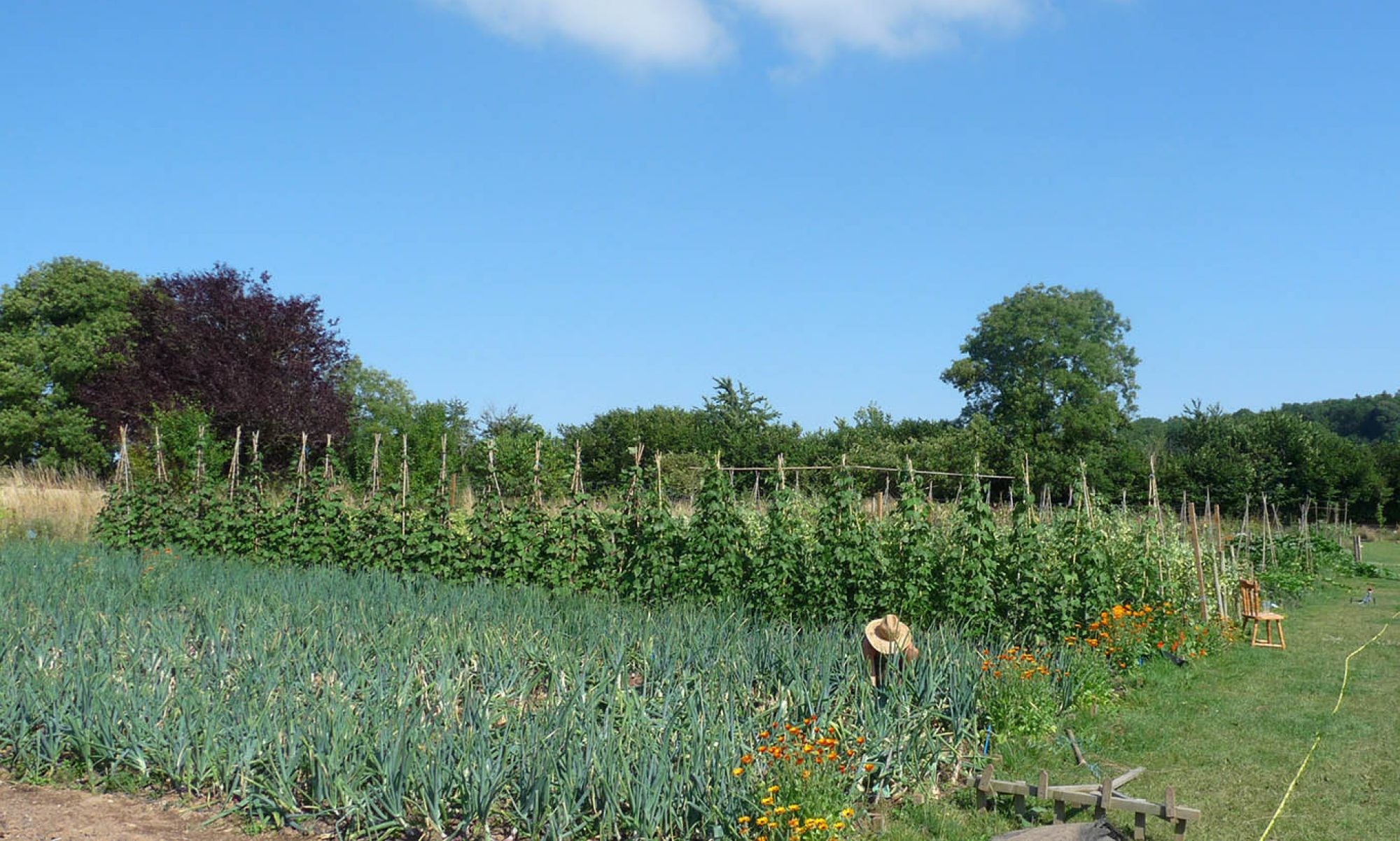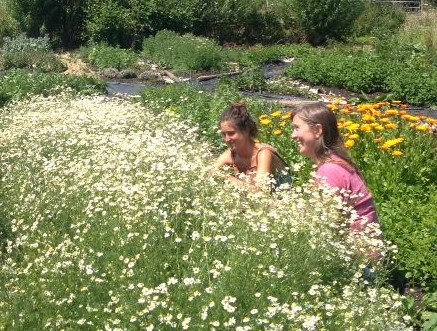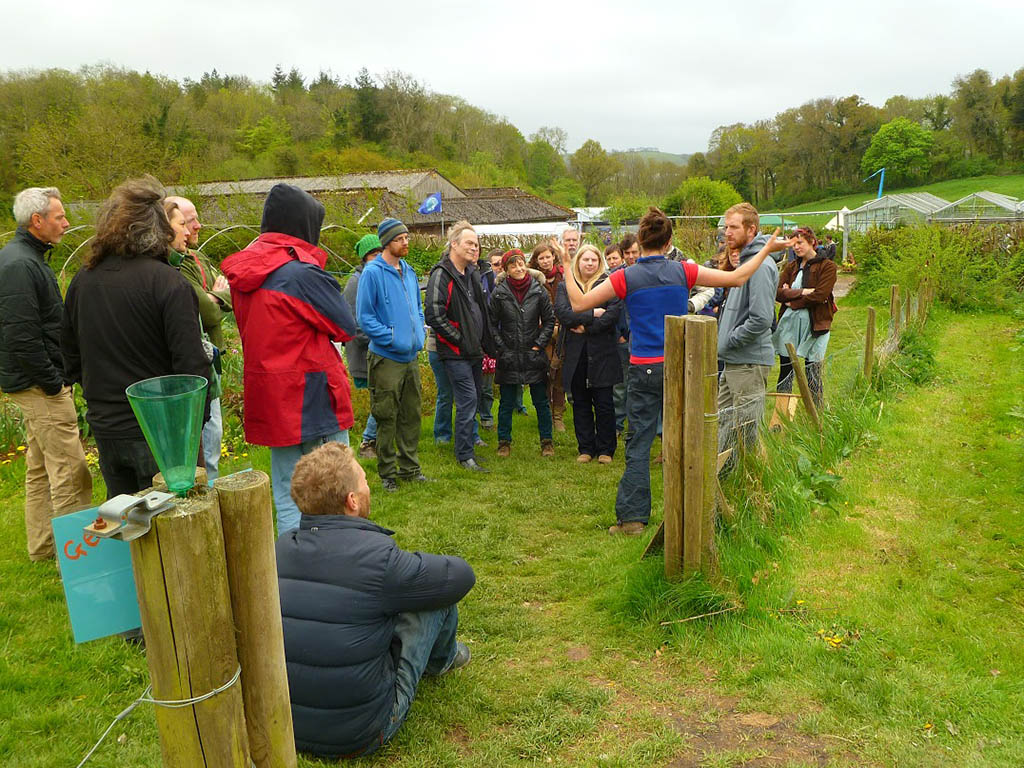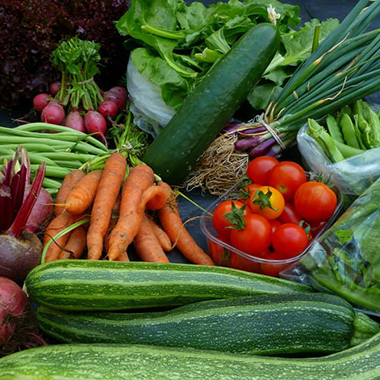Tea, Tour and Plant Sale

Green Manures
We’ve started planning for next year’s season, getting lots of green manures in to help build the fertility and structure in our soils. We sow these crops on overwintering beds and area we are leaving fallow, and incorporate into the soil a couple of months before we use the bed.
This year we are trying a cocktail of different green manure plants, and have just sown the following mix on beds in the bottom field:
- Alfafa– Alfafa, or Lucerne, is a legume meaning it works in symbiosis with rhizobium bacteria to fix nitrogen from the air into a form that plants can access
- Phacelia– Phacelia is great at suppressing weeds and holds lots of nitrogen in its foliage- reducing the amount of soil nitrogen washed away by the rain. It also has beautiful purple flowers that pollinators love!
- Fodder radish– this brassica is good for breaking through compacted soil, as well as being a great weed suppresor, and a seedy feast for birds!
We are finding it a bit of a challenge sowing green manure during this drought, as they struggle to germinate with the help of sprinklers (expensive). But rain is forecast this weekend so watch this space!

Fodder Radish

Alfalfa

Phacelia
What to do with a french bean glut!
The beautiful sunshine has meant the french beans are attempting world domination (Day of the Triffids style), and we have so many green beans to share with our members. Here are our favourite recipes and methods for dealing with a french bean glut.

Make Fry Bodi (Trindanian fried beans)
This a super simple way to enjoy your beans, and all the ingredients are seasonal! There’s loads of recipes for this out in internet land, but we like this one
- Chop up an onion, 2 cloves of garlic, and 2 ripe largish tomatoes

- Fry the above for about 3 minutes in olive oil
- Add two handfuls of french beans, destalked and chopped into bitesize chunks
- Add salt to taste, cover and steam for about 5 minutes. Uncover and continue to cook for about 10-15minutes until the liquid has disappeared, stirring occasionally.
- Serve with flat bread or as a side dish
Green Bean Salad with Feta and Mint
Can’t face hot food or planning a picnic by the river Dart? This is the one for you. If you are after a vegan dish you can swap the feta for toasted almonds.
- Destalk and chop about 300g of french beans. Place in a pot of hot water and boil for 4-5 minutes
- Make a dressing using some olive oil, salt, 1 clove of crushed garlic, and some balsamic vinegar
- Chop 200g of feta cheese into cubes. Mix with cooked beans and dressing.
- Sprinking over a handful of finely chopped mind, and some thinly sliced red onion and stir. Yum.
Freeze them for a winter day!
Some people say it’s ok to freeze beans without blanching first, but others swear that this spoils to texture. The be on the safe side here is how to blanche and freeze beans
- Remove stalks and tails from beans, and chop into bit size chunks
- Heat up a saucepan of water. When boiling add you beans, and boil for 3 minutes
- Remove with a slotted spoon and place in a bowl of water and ice-cubes, chill for another 3 minutes
- Remove beans from the cold water, drain and remove excess water with kitchen towel.
- Put into freezer bags, remove air and seal. Don’t forget to write the date on the bag!
- Freeze and enjoy in the winter for a reminder of the summer.
Sad onions and happy corn
South Devon is currently being blessed with day after day of brilliant sunshine and amazing blue skies. The Met Office reliably informs us there will not be a drop of rain for at least a week. This is great for our long evening barbecues and after work river swims, but how are our crops holding up in this summer drought?
 Many of our plants are succumbing to the dry conditions. Our winter brassica seedlings need watering a least twice a day before we plant them out next month. Some of our oriental salad leaves have wilted back into the earth. On top of that we suspect our entire onion crop has powdery mildew (Leveillula taurica), a fungus that overwinters in the soil. The dry weather has put stress on the onions ability to resist the pathogen, which is probably a result of a relatively wet spring followed by a long summer drought.
Many of our plants are succumbing to the dry conditions. Our winter brassica seedlings need watering a least twice a day before we plant them out next month. Some of our oriental salad leaves have wilted back into the earth. On top of that we suspect our entire onion crop has powdery mildew (Leveillula taurica), a fungus that overwinters in the soil. The dry weather has put stress on the onions ability to resist the pathogen, which is probably a result of a relatively wet spring followed by a long summer drought.

It’s not all bad news though- lots of plants are loving the sunshine. Our tomatoes are developing fast and the courgettes are having a field day. The sweet-corn especially needs sunny weather of 25°c plus to really thrive, and is shooting up. Looking forward to a bumper corn harvest in a month or two.
If anyone would like to do a rain-dance for us though it would be much appreciated!
Monthly Herb Shares
 In it’s second year, the herb garden at School Farm is thriving. The herb garden is an abundant space, with over 75 different herbs cultivated organically and growing wild. Plants range from familiar Mints, Chamomile and Fennel, to the more unusual Anise Hyssop and Marsh Mallow, with everything in-between.
In it’s second year, the herb garden at School Farm is thriving. The herb garden is an abundant space, with over 75 different herbs cultivated organically and growing wild. Plants range from familiar Mints, Chamomile and Fennel, to the more unusual Anise Hyssop and Marsh Mallow, with everything in-between.We aim to make locally grown organic herbs more available for people to taste, cook with, learn from and grow themselves. For 2019 we are offering two options of monthly herb shares – join us for the season and share the herbal harvest each month!
This year the garden will be offering two options for monthly herb shares. The “Gather-Together”share is a chance to join others in the garden each month to harvest in-season herbs, seeds and cuttings for your own use and to share recipes and growing skills. This share runs from May to October, with harvest days on the 3rd Friday & Sunday of the month, from 2pm to 5pm. The cost is a sliding scale from £7.50 to £15/ month.
The “Gather-Together”share is a chance to join others in the garden each month to harvest in-season herbs, seeds and cuttings for your own use and to share recipes and growing skills. This share runs from May to October, with harvest days on the 3rd Friday & Sunday of the month, from 2pm to 5pm. The cost is a sliding scale from £7.50 to £15/ month.
With the “Harvest-Basket”share members will receive a monthly bag of two dried herb blends and a mixed bunch of fresh herbs for teas and cooking. Blends will vary each month, and include some favorites like Chamomile and Spearmint with a hint of Lavender and Rose, Raspberry leaf and Lemon Balm for teas, and Marjoram and Oregano, and dried Basil for cooking. This share runs from June to November (6 months) and costs £15/ month.
You can sign up using the form here email mel@schoolfarmcsa.org.uk to join.
A tale of two composts
Hello!
Today we’ve been clearing out an old glasshouse and preparing beds for our aubergines, chillis and pepper. Nice to get out of the rain! We used two types of compost on the beds and noticed some big differences between them!
 The first type we used was our own compost that was made up of old crops and manky vegetables, which was left to decompose for a year. As we spread it over the beds it teemed with life- worms, ants, woodlice, and most excitingly loads of millipedes and centipedes. These apex predators are a great sign for gardeners, as they indicate you have a super healthy food web in your soils. Having a big diversity of critters in your compost injects your soil with life, which helps with natural nutrient cycling!
The first type we used was our own compost that was made up of old crops and manky vegetables, which was left to decompose for a year. As we spread it over the beds it teemed with life- worms, ants, woodlice, and most excitingly loads of millipedes and centipedes. These apex predators are a great sign for gardeners, as they indicate you have a super healthy food web in your soils. Having a big diversity of critters in your compost injects your soil with life, which helps with natural nutrient cycling!
The second compost we used was a soil conditioner made from commercial green waste. In comparison to our home made batch, this compost was a sterilized, lifeless desert. But it still serves a great purpose as a mulch to stop the pesky weeds. And because it’s really woody it provides a slow release nitrogen supply, so our beds will benefit from it over time.
If you want to find out more about the wonderful world of compost join us for our next composting short course on the 26th May here at School Farm. You’ll find out how to make perfect compost and get a lovely lunch of soup and salad.
5 reasons to be a member of School Farm CSA!
Ever wondered why you should become a member of School Farm CSA?
1) You get the freshest veg around- we pick all of our produce the day it is picked up by members
2) You will be part of a community of people wanting to change the food systems for the better! We hold regular volunteer events for members and will keep in touch with you with farm news.
3) We offer a members discount on every short-course we run
4) We are using the most ecological methods to grow our veg. We are organic, operate on a minimum tillage system to protect our soil, and use very little machinary
5) You are supporting the local economy! We don’t buy produce in from anywhere, so the majority of our turnover is kept in the Totnes area
To find out more visit our membership page or email info@schoolfarmcsa.org.uk
Sowing the Seeds of Spring!
Spring is poking her head out in between rain clouds, and the farm is slowly coming back to life after a long cold winter. We are busy getting everything ready for the season ahead, trying to rid the greenhouse of millions of tiny chickweed seedlings and planting seeds of our own. So far we’ve planted courgettes, cucumbers, turnips, beetroots, tomatoes…. and the list goes on.
If you would like to be part of our growing community and receive a share of the harvest then please get in touch via our membership page. Members receive a super fresh veg box, grown here on the Dartington Estate using ecological, no dig methods. We also encourage members to get involved in farm life through our volunteer days, educational and members events- watch this space for more updates!
Membership
Care for the land. Care for the farmers. Care for the community. Fresh, seasonal, unique, local, healthy, abundant food. There are lots of reasons to join the CSA family and receive a share of veg.








